French
At Holy Rosary Catholic Voluntary Academy, we believe that the learning of a foreign language provides a valuable educational, social, and cultural experience for every child.
Pupils not only develop their linguistic proficiency in a new language; they also develop their communication and literacy skills by deepening their understanding of their own language, and they lay the foundations for all future language learning, especially as pupils move onto their next phase of education.
As many of our children are already bilingual, we choose to celebrate and explore our international diversity alongside French, our chosen modern foreign language.
The focus of study in modern languages will be on practical communication.
The aims and objectives of learning Modern Foreign Languages:
- foster an interest and curiosity in learning other languages by introducing children to another language in a way that is enjoyable and fun
- encourage children to be aware that language has structure and that the structure differs from one language to another, laying the foundations for future language study
- improve Oracy and communication skills by providing opportunities to develop speaking and listening competences
- develop children’s awareness of cultural differences and enhance their Cultural Capital
- enable children to develop strategies for learning new vocabulary, which can be transferred to other areas of the curriculum.
By learning French at Holy Rosary, pupils will:
- understand and respond to spoken and written language from a variety of authentic sources
- communicate with increasing confidence, fluency and spontaneity, continually improving the accuracy of their pronunciation and intonation
- develop strategies to learn new vocabulary and a new phonics
- gain an appreciation of French culture.
Each class enjoys a lesson of between 30 and 45 minutes a week, during which they actively engage with the language through stories, songs, poems, games, videos (using native speakers) and role-plays.
Each half-termly topic begins with revisiting familiar words and phrases from previous learning before new vocabulary is introduced. This is then used in simple sentences which are practised and extended until a text, presentation or roleplay is created at the end of the unit.
In FS2, stories and songs introduce the children to the sounds of French.
In KS1, these stories and songs are revisited and added to, while games are played to consolidate vocabulary. Words are extended to simple sentences, then to role-plays, and exercise books are introduced in Pentecost term Y2 to begin creating a bank of knowledge.
In KS2, all skills and knowledge from KS1 are consolidated and broadened. French phonics are gradually introduced more formally, allowing the children to explore the phoneme grapheme correspondence, which leads to more confident and accurate pronunciation and reading. Basic grammar is also taught, which fosters independence in the language generation process as children understand how words fit together.



